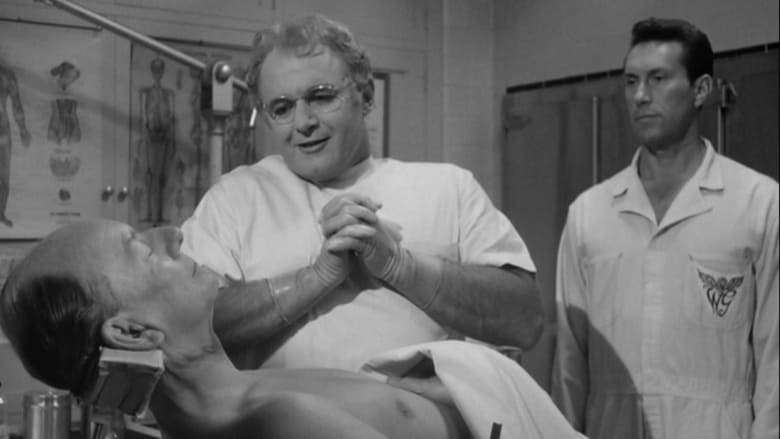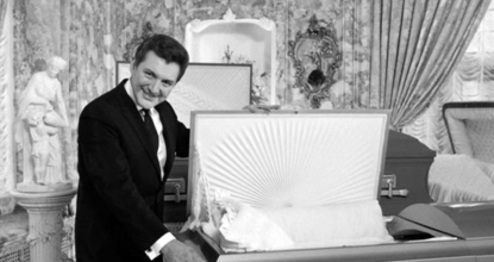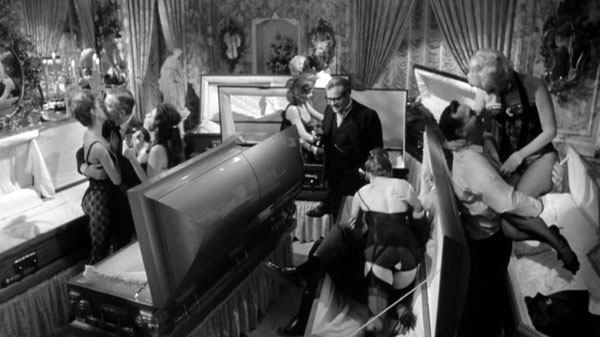← Back to Reviews

in
The Loved One
The recent passing of Robert Morse motivated my first viewing of 1965's The Loved One, a sumptuously mounted, star-studded, dark, and mean spirited black comedy that's a little more complex than it needs to be but is fascinating entertainment due to a squirm-worthy screenplay, a one of a kind cast, and some extraordinary production values.

Morse plays Dennis Barlow, an aimless British poet who moves to Los Angeles on a whim and moves in with his Uncle Sir Francis (John Gielgud), who is employed in some non-specific way by a movie studio. After Francis loses his job, he quietly returns home and hangs himself. Dennis, of course, is left to the funeral arrangements and is led to a mysterious funeral empire called Whispering Glades, that appears to be its own world, run by the Reverend Glenworthy (Jonathan Winters), where he is entranced by one of the home's cosmetologists named Aimee (Anjanette Comer).

While Dennis finds himself battling for Aimee's affections with the parlor's embalmer, Mr. JoyBoy (Rod Steiger), his introduction to the world of Whispering Glades leads him to taking a job at a pet cemetery called The Happy Hunting Grounds Memorial Home, which is run by a part time Hollywood agent named Harry (also Winters).

This film has quite the offscreen pedigree. The overly intricate, but never uninteresting screenplay, based on a novel by Evelyn Waugh, is by Terry Southern (Dr. Strangelove, Easy Rider) and Christopher Isherwood (Cabaret, A Single Man). As a matter of fact, this film reminded me lot of Dr. Strangelove in its savage skewering of death as a business and the funeral business as one big sting operation that manipulates people through their grief. The scene where the casket salesman (a surprisingly on-target performance from Liberace (!)) is offering his wares to Dennis, is nothing short of brilliant. Tony Richardson was in the director's chair, fresh off winning twin Oscars for producing and directing the 1963 Best Picture Oscar winner, Tom Jones.

As a satire of the funeral business, the film scores a direct bullseye, but as the final act of the program commences, there's a connection to the future of the space program that muddies the cinematic waters and drains a lot of the fun out of what we've seen to that point. The film is also rich with some of cinema's most bizarre characters, especially Dr. JoyBoy, not to mention where the story takes the fresh-faced Dennis and the virginal Aimee, whose on the surface star-crossed romance, hits a lot of dark potholes along the way.

The black and white photography notwithstanding, Richardson has spared no expense in the looks of this film. Haskell Wexler's cinematography and future director Hal Ashby's editing are extraordinary. Production and set direction are superb as well...the eye-popping Whispering Glades is awash in elaborate statues, offices, laboratories and greenery that defy description. Big bouquet to John Addison's music too.

This film is also a dream for cinephiles who love star power. Morse works very hard to make the journey that Dennis Barlow takes here credible, despite a questionable British accent. Steiger and Winters do Oscar-worthy work, especially Winters in a dual role that rivals Peter Sellers' dual role in Dr. Strangelove. And if you pay attention you will also catch appearances from James Coburn, Robert Morley, Dana Andrews, Roddy McDowell, Tab Hunter, Lionel Stander, Barbara Nichols, Milton Berle, Margaret Leighton, Reta Shaw and a blink or you'll miss it bit from Jamie Farr. This film also marked the film debut of future Oscar and Grammy winning singer/songwriter Paul Williams as an obnoxious child prodigy. It runs out of gas before the end, but a riveting film experience for most of the running time.
The recent passing of Robert Morse motivated my first viewing of 1965's The Loved One, a sumptuously mounted, star-studded, dark, and mean spirited black comedy that's a little more complex than it needs to be but is fascinating entertainment due to a squirm-worthy screenplay, a one of a kind cast, and some extraordinary production values.

Morse plays Dennis Barlow, an aimless British poet who moves to Los Angeles on a whim and moves in with his Uncle Sir Francis (John Gielgud), who is employed in some non-specific way by a movie studio. After Francis loses his job, he quietly returns home and hangs himself. Dennis, of course, is left to the funeral arrangements and is led to a mysterious funeral empire called Whispering Glades, that appears to be its own world, run by the Reverend Glenworthy (Jonathan Winters), where he is entranced by one of the home's cosmetologists named Aimee (Anjanette Comer).

While Dennis finds himself battling for Aimee's affections with the parlor's embalmer, Mr. JoyBoy (Rod Steiger), his introduction to the world of Whispering Glades leads him to taking a job at a pet cemetery called The Happy Hunting Grounds Memorial Home, which is run by a part time Hollywood agent named Harry (also Winters).

This film has quite the offscreen pedigree. The overly intricate, but never uninteresting screenplay, based on a novel by Evelyn Waugh, is by Terry Southern (Dr. Strangelove, Easy Rider) and Christopher Isherwood (Cabaret, A Single Man). As a matter of fact, this film reminded me lot of Dr. Strangelove in its savage skewering of death as a business and the funeral business as one big sting operation that manipulates people through their grief. The scene where the casket salesman (a surprisingly on-target performance from Liberace (!)) is offering his wares to Dennis, is nothing short of brilliant. Tony Richardson was in the director's chair, fresh off winning twin Oscars for producing and directing the 1963 Best Picture Oscar winner, Tom Jones.

As a satire of the funeral business, the film scores a direct bullseye, but as the final act of the program commences, there's a connection to the future of the space program that muddies the cinematic waters and drains a lot of the fun out of what we've seen to that point. The film is also rich with some of cinema's most bizarre characters, especially Dr. JoyBoy, not to mention where the story takes the fresh-faced Dennis and the virginal Aimee, whose on the surface star-crossed romance, hits a lot of dark potholes along the way.

The black and white photography notwithstanding, Richardson has spared no expense in the looks of this film. Haskell Wexler's cinematography and future director Hal Ashby's editing are extraordinary. Production and set direction are superb as well...the eye-popping Whispering Glades is awash in elaborate statues, offices, laboratories and greenery that defy description. Big bouquet to John Addison's music too.

This film is also a dream for cinephiles who love star power. Morse works very hard to make the journey that Dennis Barlow takes here credible, despite a questionable British accent. Steiger and Winters do Oscar-worthy work, especially Winters in a dual role that rivals Peter Sellers' dual role in Dr. Strangelove. And if you pay attention you will also catch appearances from James Coburn, Robert Morley, Dana Andrews, Roddy McDowell, Tab Hunter, Lionel Stander, Barbara Nichols, Milton Berle, Margaret Leighton, Reta Shaw and a blink or you'll miss it bit from Jamie Farr. This film also marked the film debut of future Oscar and Grammy winning singer/songwriter Paul Williams as an obnoxious child prodigy. It runs out of gas before the end, but a riveting film experience for most of the running time.
